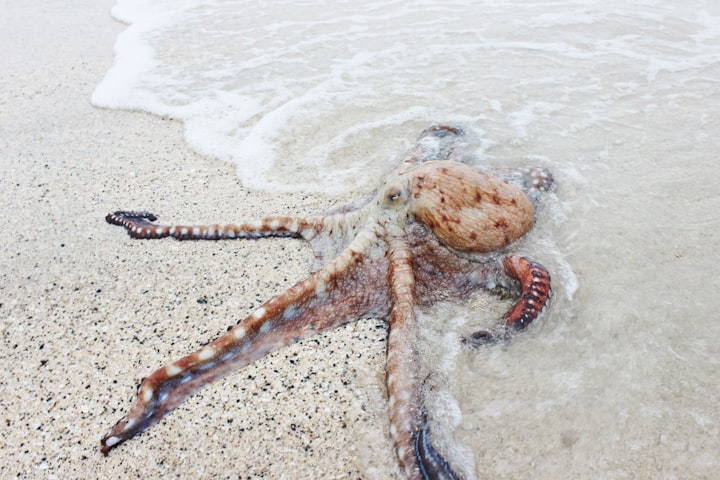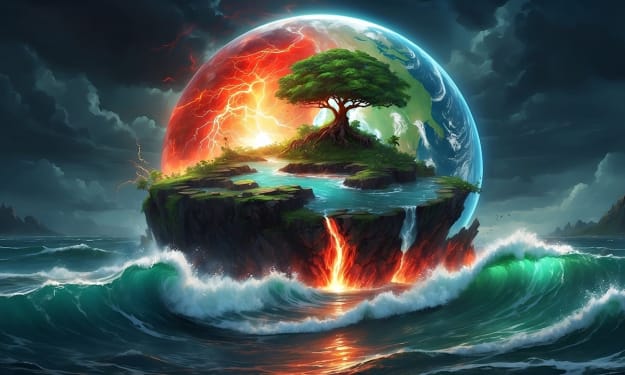THE KRAKEN
What if the mythical creature is real? What other creatures lurk in the deep waters?

Scientists and sea biologists have raised concerns about the increasing population of massive squids in the world's oceans. These squids, surpassing the combined mass of all people, possess extraordinary reproductive capabilities. Female squids can lay an astounding number of eggs, ranging from three to one hundred thousand. While most of these eggs may not survive, the sheer quantity is still a significant concern. Furthermore, the squids' metabolism is accelerating due to rising water temperatures, leading to even more rapid population growth.
Squids have been dubbed the "weeds of the seas" due to their ability to reproduce quickly, potentially surpassing the populations of all fish and mammals. If their numbers continue to rise unchecked, they may deplete the food sources on the ocean floor, forcing them to migrate closer to the surface. This migration could include both smaller squids and monstrous giants, possibly even the legendary Kraken. Such a scenario poses a tremendous problem for humanity and all creatures on Earth.
As the dominant species, humans could devise means to combat the Krakens, such as inventing poisons. However, spreading such poison in the water would risk disrupting the entire planet's ecosystem. Over half of the world's oxygen is produced by the ocean, and poisoning the water would harm not only the squids but also other marine life, including fish, dolphins, whales, seaweed, and phytoplankton. Consequently, humanity must abandon the idea of poisoning the water, leaving them helpless in the face of a potential squid apocalypse.
Suppose billions of squids, including millions of Krakens, emerge on the ocean's surface. In that case, they would undoubtedly seek sustenance, potentially devouring fish shoals and even massive whales. No force could effectively halt them, not even if megalodons still existed. The decline in fish populations would render traditional fishing futile, leading to soaring seafood prices worldwide. However, a solution arises in the form of catching giant squids, which becomes a prestigious and dangerous profession worldwide.
Sea travel becomes perilous as Krakens swim close to the surface, posing a significant risk to cargo vessels and transportation networks that sustain entire economies. Consequently, air travel becomes the preferred method of international communication, resulting in increased flight costs and a reduction in tourists. The beaches lose their allure as hungry, aggressive giant squids may venture ashore, prompting the installation of fences and swimming bans. Scientists develop sound barriers and floodlights to ward off the squids temporarily, but the effectiveness wanes over time.
As squids multiply, they begin to fight among themselves, resembling a struggle between parasites. Giant Krakens triumph over smaller squids, causing a decline in their population. In the aftermath, billions of small squids overwhelm the surviving giants, and the cycle continues. This ongoing battle eventually leads to the scarcity of fish in the ocean, exacerbating the existing problem.
In an attempt to address the situation, scientists resort to utilizing a gene drive, a substance capable of altering the genetic code of living organisms. Initially implemented against invasive species like mosquitoes causing malaria, gene drives offer a cost-effective method to control populations. However, employing such methods against squids carries potential risks, as their disappearance could disrupt the ecosystem. With the small squids largely eliminated, a gene drive is deployed against the remaining Krakens, gradually reducing their numbers over several years.
As the ocean ecosystem begins to recover, fish and marine mammal populations thrive. Whales, sharks, octopuses, salmon, and countless other species experience growth, replenishing the oceans. However, a new threat emerges from the depths. Without squids and Krakens to restrain them, massive crabs begin to surface. These formidable creatures, numbering in the hundreds of thousands, pose a significant danger as they venture onto land, shaking the very foundation of the ocean ecosystem.
In summary, the increasing population of squids, particularly the possibility of Krakens, presents numerous challenges for humanity and the planet's ecosystem. While the precise nature of these sea monsters remains shrouded in mystery, the potential consequences of their proliferation are cause for concern. Scientists and researchers continue to explore various strategies, from capturing squids to employing gene drives, in an attempt to manage the situation and mitigate the potential risks to both humans and the ocean ecosystem.





Comments
There are no comments for this story
Be the first to respond and start the conversation.